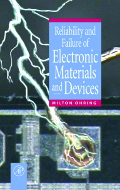Reliability and Failure of Electronic Materials and Devices

Suitable as a reference work for reliability professionals or as a text for advanced undergraduate or graduate students, this book introduces the reader to the widely dispersed reliability literature of microelectronic and electronic-optional devices. Reliability and Failure of Electronic Materials and Devices integrates a treatment of chip and packaging level failures within the context of the atomic mechanisms and models used to explain degradation, and the statistical handling of lifetime data.
Electromigration, dielectric radiation damage and the mechanical failure of contacts and solder joints are among the failure mechanisms considered. An underlying thread of the book concerns product defects--their relation to yield and reliability, the role they play in failure, and the way they are experimentally exposed. The reader will gain a deeper physical understanding of failure mechanisms in electronic materials and devices, acquire skills in the mathematical handling of reliability data, and better appreciate future technology trends and the reliability issues they raise.
Key Features
- Discusses reliability and failure on both the chip and packaging levels
- Handles the role of defects in yield and reliability
- Includes a tutorial chapter on the mathematics of reliability
- Focuses on electromigration, dielectric breakdown, hot-electron effects, electrostatic discharge, corrosion, radiation damage and the mechanical failure of packages, contacts, and solder joints
- Considers defect detection methods and failure analysis techniques
https://shop.elsevier.com/books/reliability-and-failure-of-electronic-materials-and-devices/ohring/978-0-12-088574-9
Terms
While we only use edited and approved content for Azthena
answers, it may on occasions provide incorrect responses.
Please confirm any data provided with the related suppliers or
authors. We do not provide medical advice, if you search for
medical information you must always consult a medical
professional before acting on any information provided.
Your questions, but not your email details will be shared with
OpenAI and retained for 30 days in accordance with their
privacy principles.
Please do not ask questions that use sensitive or confidential
information.
Read the full Terms & Conditions.